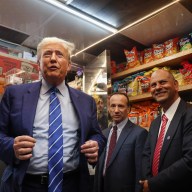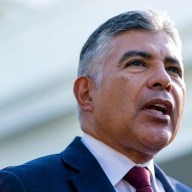OTTAWA – If six months is a lifetime in politics, then the past year was that and reincarnation rolled into one for Stephen Harper.
The prime minister went from spinning the government into full-blown crisis last November with an inflammatory and nearly suicidal economic statement, to being reborn on top of the polls exactly a year later.
“It’s funny, it’s like a personal training exercise,” said former Harper adviser Tom Flanagan. “Stephen’s dug a big hole for himself and then climbed out of it.”
A mere dozen months ago, the Nov. 27, 2008 economic update dealt a staggering blow to Harper’s reputation as a brilliant political tactician and put his future as prime minister on a knife’s edge.
The update’s surprise move to eliminate quarterly government subsidies to political parties stunned and emboldened the three wounded opposition parties to band together and propose a coalition to replace the government.
Stephane Dion, who had been soundly rejected by the electorate and his own party a scant few weeks earlier, suddenly found himself within grasp of 24 Sussex Drive.
None of Ottawa’s political big brains saw it coming. Canadians weren’t impressed.
“It’s always a question of exactly what it is that the voting public is focusing on, and at that particular point in time a year ago they were seeing the worst of everything they suspected about Harper, that he was venal, overly partisan and a little bit sneaky,” recalls Allan Gregg, chairman of Harris-Decima.
Flanagan says the fact that Finance Minister Jim Flaherty was still talking about balancing the budget, at a time when the world economy was clearly in trouble, compounded Harper’s troubles.
It was the lowest ebb of Harper’s time in office. It was clear he had severely misread his opponents. The air of competence he had nurtured for three years was replaced by palpable panic. In a series of private meetings with his closest cabinet aides, he sought solace and advice. They urged him to fight for his job.
Harper moved to shut down Parliament and produce a new Speech from the Throne and budget, while at the same time inspiring fear and loathing in the coalition concept.
A Canadian Press Harris-Decima survey released Thursday suggested that 41 per cent of Canadians thought that was the best outcome a year ago.
Another 10 per cent of those polled would have preferred an election ending in a Conservative victory, while 31 per cent would have liked to see the Liberals attain power – either by election or in a coalition government.
There is even better news for Harper when voters are asked about leadership. A majority of 51 per cent had a favourable opinion of the prime minister, set against 41 per cent who view him unfavourably. Liberal Leader Michael Ignatieff was viewed favourably by 31 per cent of respondents, with 50 per cent viewing him unfavourably.
How did Harper orchestrate the turn around? Observers point to his legendary discipline, a Terminator-like ability to regroup and shed previous weaknesses.
Gregg says that even before the economic statement last November, Canadians were starting to see Harper as a competent, decisive manager.
“What they had witnessed in the ensuing period of time is a refocusing of those various attributes. He looks steady,” said Gregg.
“He hasn’t looked mean, or venal or partisan or sneaky, any of those things they saw there, and as we know, Ignatieff has stumbled and they have done a pretty good job of painting him as somehow who is maybe not there for all the right reasons.”
The party’s “Just Visiting” ads, which suggested Ignatieff was an arrogant dilettante, were hardball but wisely not over the limit, says Flanagan.
“I don’t the ads had any effect until Ignatieff made his big miscalculation of trying to force an election (this September),” says Flanagan, a political scientist with the University of Calgary.
That wasn’t such a bad idea necessarily, but what was dumb was giving the government so much time to react to it.”
Ignatieff’s miscalculation at the end of the summer gave Harper the final boost, giving him a healthy lead in the polls as the anniversary of his own huge miscalculation approaches.
Former Liberal cabinet minister Sheila Copps acknowledges that Ignatieff has had problems with visibility and with crafting a focused message.
But she says that Harper is still hitting his head on a ceiling that keeps him from grabbing a majority.
“Mr. Harper saved himself from a near death experience, and he’s certainly found a second or third life, but his numbers should be stronger with all the problems that opposition has faced in the coalition issues and some of the organizational issues that Mr. Ignatieff has faced,” said Copps, who now writes columns as a political pundit.
Copps predicts that the political pendulum will swing back again, and Harper will stumble on such issues as climate change, the recent Afghan detainee controversy, and how stimulus money has been spent.
“The spending decisions and not just the announcement are going to be parsed in greater detail, and that’s probably going to blow back on the government.”
















